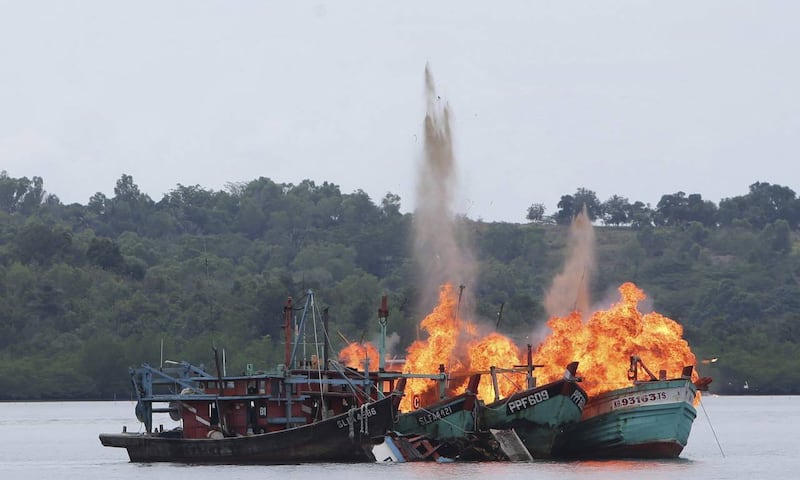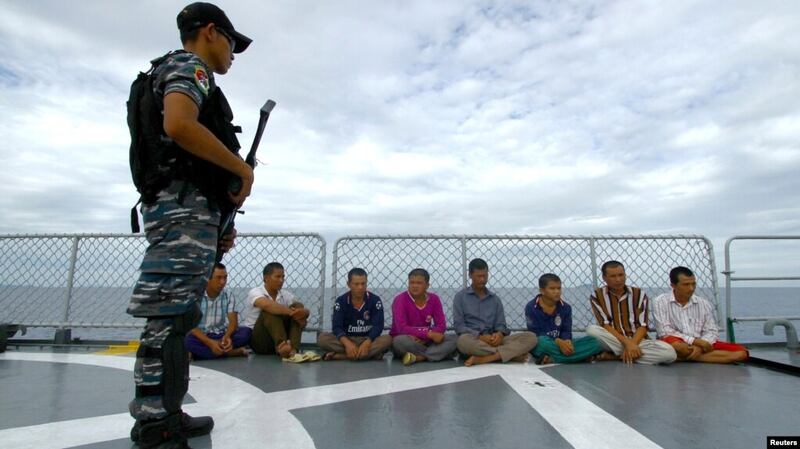A Vietnamese fisherman was seriously wounded in a shooting incident that highlights the precarious situation of fishing crews in the disputed South China Sea.
Vo Minh Quan from Binh Chau, an old fishing village in central Quang Ngai province, told local Vietnamese media that his boat was attacked during the night of Sept. 9 by a group of armed foreign men who also robbed them of their equipment and fish.
The boat was anchored about 40 nautical miles (74 kilometers) southeast of Pigeon Reef, a Vietnamese outpost in the Spratly Islands. After being shot, the 52-year-old man was transferred to Pearson Reef, a larger rock that Vietnam has occupied since 1978. There he was given first aid, then sent to the mainland.
“It was Vietnamese waters,” said Bui Duy Tan, the captain of the boat. “It’s our traditional fishing ground and we regularly fish here,” he told the Nguoi Lao Dong newspaper.
Quang Ngai authorities have launched an investigation into the shooting but the fishing boat’s crew said it happened too fast, in the dark and they could not tell the nationality of the perpetrators. It was not far from the Philippines’ Palawan island, as well as Malaysia’s Sabah state, but also easily accessible from a rock occupied by China in the Spratlys.
“At this stage, it’s impossible to say where the attackers came from,” said Vu Thanh Ca, a former senior government official who spent his whole career studying the South China Sea. “They might even be pirates.”
The bullet penetrated Quan’s leg and he will have to undergo a number of operations and probably retire from fishing.
In another incident two years ago near Malaysia’s Kelantan state, a Vietnamese fisherman died after being shot by the Malaysian coast guard. His colleagues were detained by the Malaysian Maritime Enforcement Agency forillegal fishing, illegal entry and attempted murder as they resisted the authorities’ efforts to inspect their boat.
Malaysia detained over 400 Vietnamese fishermen in 2021. In June this year, Malaysia detained 42 Vietnamese fishermen and released them after three months.
In 2016, Vietnam’s foreign ministry accused the Indonesian Navy of chasing and shooting at Vietnamese fishing boats, injuring three crew members, one of whom died of gunshot wounds afterwards.
In 2021 alone Indonesia seized 42 Vietnamese fishing boats, sank some of them and detained more than 270 Vietnamese fishermen.

Turbulent waters of the South China Sea
Regional fisheries in the South China Sea are estimated to generate U.S. $100 billion annually, supporting the livelihoods of around 3.7 million people, according to a report released earlier this year by the University of British Columbia in Canada.
Analysts say overfishing and climate change could fuel serious tensions and even armed conflict.
“If countries in the region really cared about fisheries, they would negotiate a sensible agreement to manage them sustainably,” said John Quiggin, professor of economics at the University of Queensland.
Quiggin believes that disputes and lawlessness put tremendous pressure on fish stocks, and unresolved conflict increases risk of overfishing and collapse.
A number of countries bordering the South China Sea, such as China and Vietnam, also promote fishing as a means to reinforce their sovereignty claims and this further complicates matters.
“If you look at overlapping areas between Vietnam and Malaysia in the South China Sea, you will see disputes over fishing rights are directly related to disputes over territorial claims,” said Viet Hoang, a well-known South China Sea legal expert.
“It will take years, if at all, to resolve the disputes,” he said.

Six parties including Brunei, China, Malaysia, the Philippines, Vietnam and Taiwan hold rival claims to parts of the South China Sea but China’s claims are the most expansive, equaling almost 90% of the sea.
With up to 800,000 vessels, China’s fishing fleet is by far the largest in the world. In the South China Sea, China has been accused of operating a fleet of armed fishing militia to enforce its sweeping sovereignty claims, pushing away fishing fleets from other countries.
For its part, China has been pointing at what it calls “Vietnamese fishing vessels’ radical activities.”
The South China Sea Probing Initiative (SCSPI), a Chinese think tank, said that in Aug. 2022, a total of 8,140 Vietnamese fishing vessels were tracked in the South China Sea, a significant increase from 6,622 in the previous month.
The Vietnamese government needs to strengthen their efforts to stamp out illegal fishing, analysts said. They also suggested better cooperation between countries bordering the South China Sea to prevent future conflicts.
“As neighboring countries still dispute their exclusive economic zones, it’s recommended that they could try to agree on joint fishing areas and hold joint patrols in order to avoid misunderstanding,” said Viet Hoang, the Vietnamese legal expert.
